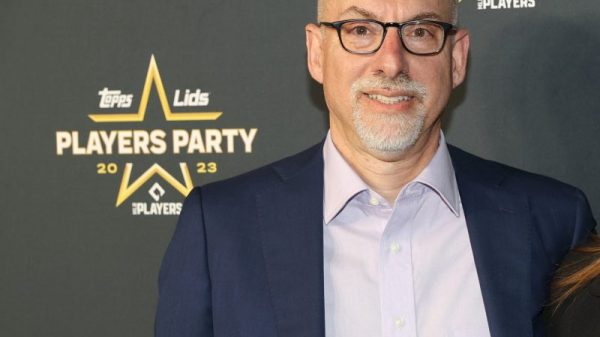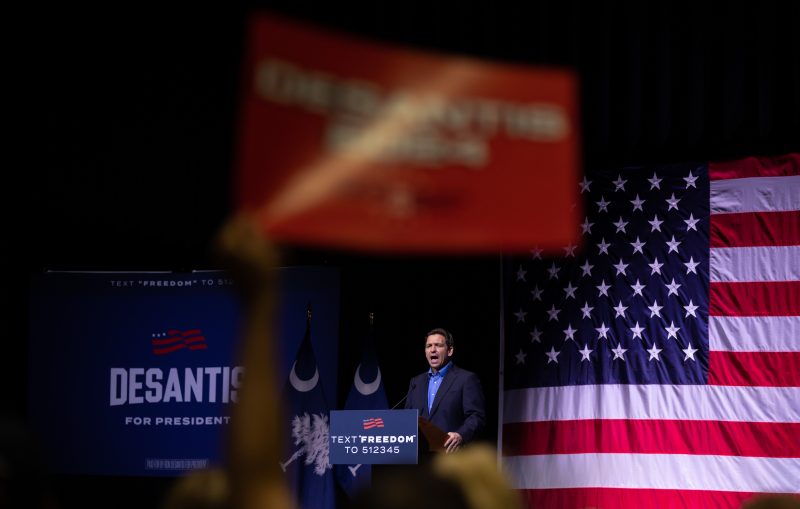GILBERT, S.C. — Ron DeSantis shouted back when a woman interrupted his speech to call him a “fascist,” jabbing his finger and likening his heckler to the “people we beat every single day on policy” in Florida. The crowd roared in approval. “We do not let them win. We win all these battles,” he boasted.
Half an hour later, the governor put a softer side on display. From two couches, he and his wife, Casey DeSantis, discussed their three kids, joked about crayon marks at the governor’s mansion and took one question from the audience: “I was wondering how you met?” Greeting the crowd afterward, he beamed at a woman who read his book and told another about his kids’ love for the Florida State Seminoles.
But the governor wasn’t one for extended conversations, often replying quickly and moving on. “Yup,” he said when a young man thanked him for a signature. “Got it?” he asked as the next photo snapped. “All right.”
The event here Friday came toward the end of a three-state tour that illustrated how DeSantis is seeking to connect with voters as he begins his campaign for president. He showcased the combative streak and policy achievements that have built him a following on the right. He emphasized his family, bringing his wife up to speak at each stop and sharing anecdotes about parenting. And he avoided town hall-style questioning from voters and mostly kept his unstructured interactions with them brief.
Lisa Komisar, 54, didn’t get to chat with DeSantis as he grabbed her sign for an autograph, but she still came away impressed. “He’s a young family man, and I think that a lot of people can relate to that,” Komisar said. Others had lingering questions. South Carolina state Sen. Katrina Shealy (R), who recently tried in vain to block a six-week abortion ban in her state, predicted that DeSantis would have to take town hall questions down the line and said she wanted to know how the governor would handle abortion nationally after signing a strict law in Florida.
DeSantis’s policy record and embrace of hard-right stances have helped him move into a stronger position than anyone else in the GOP field but Donald Trump, the clear polling leader. With the kind of background — blue-collar upbringing, Harvard Law, service in the Navy — that led some friends to nickname him “The Resume,” DeSantis, running a distant second and facing pressure from supporters to close the gap with Trump, now confronts a central challenge: Can he make it all translate in the kinds of intimate and closely scrutinized settings that will fill his schedule in the months ahead?
His first swing as an official candidate showed his sometimes brusque approach to the up-close-and-personal appearances expected in early states — a concern some Republicans had raised about his prospects in the months leading up to his launch. The governor had some deeper exchanges on his trip, at one point hugging a woman who talked about being a military spouse and telling her, “People don’t appreciate the family effort.” But he often met information from voters with a couple of words: “Oh, nice.” “Oh, cool.” “Oh, great.”
His approach stands in contrast to some rivals and past contenders who have embraced ask-me-anything forums and lengthier conversations with voters. Trump, who long relied on huge rallies, has started holding more intimate events, including some where he takes audience questions.
Successful presidential hopefuls have found varied avenues to leave lasting imprints on their audiences. Bill Clinton was known for his warmth in one-on-one conversations; President Biden has been known to talk at length to attendees and offer hugs; George W. Bush was the candidate voters wanted to get a beer with; Barack Obama roused people with high-energy speeches; and Trump tapped into grievances while blowing past the usual bounds of political discourse — an approach that continues to win him wide support in his party.
DeSantis, at least for now, is relying more on controlled settings to tout his record and make a more personal introduction.
“I’m not looking for social grace,” laughed two-time Trump voter Luke Underwood, 54, who saw DeSantis speak in Cedar Rapids, Iowa, and briefly talked with him about his criticisms of transgender hormone therapy. He said he’s considering both Trump and DeSantis for 2024.
“I want somebody who is a guerrilla, who’s going to go out there and fight for me,” Underwood said.
DeSantis’s four-day tour offered a first glimpse of the governor in full campaign mode. He took blunt new swings at Trump and pitched himself as more electable, more effective and a regular guy.
He tailored his message to each state: In Iowa, where Republicans have passed a six-week abortion ban, he made sure to mention the similar ban he recently signed in Florida. In New Hampshire, where Republicans have been far more reluctant to restrict abortion and have only narrow control of state government, DeSantis didn’t mention the issue over the course of several speeches.
Other policy stances — including opposition to coronavirus-related restrictions and a Florida bill to allow the death penalty for child rapists — got raucous applause in room after room, where attendees ranged from undecided voters to DeSantis die-hards and DeSantis-curious Trump supporters. The governor drew crowds that topped 1,000 in some places, filling a major convention center in South Carolina and an evangelical church in Clive, Iowa, outside Des Moines.
Kicking off his tour there, he laid out his blockbuster legislative session in Florida and his base-pleasing fights with foes such as Disney.
Then he worked the crowd — at one point passing up an opportunity for an extended conversation that other politicians might have jumped at.
“Governor, I think there’s a World War II veteran back there!” an aide told DeSantis as the crowd swarmed. The governor had just highlighted his own military service — he once deployed to Iraq with Seal Team 1 — and delivered a speech for Memorial Day.
DeSantis gave a nod in the veteran’s direction, flashed a thumbs-up, thanked him for his service and turned back to someone else waiting for a photo with him.
“The veteran would like a signature,” nudged Iowa Gov. Kim Reynolds (R), who was hovering nearby, a few beats later. She passed along a piece of paper that read “RESERVED VIP”; DeSantis scribbled his name and then walked off, looking for the next voter.
“Governor, did you want to know there’s a World War II veteran?” another person asked 30 seconds later, shouting to be heard over blasting music as DeSantis smiled for as many photos as he could.
“I know, I signed something for him!” DeSantis yelled back. He gave another thumbs-up and hustled away.
At another stop in Iowa, DeSantis also moved quickly throughout the room, patting attendees on the back before turning to the next voter. With a select few, however, he struck up longer conversations — telling a man and woman about being sent home on the first day of his first job as an electrical assistant because his shoes weren’t approved by a federal worker safety agency; animatedly gesturing as he spoke to a New Yorker about how former GOP congressman Lee Zeldin could have used some of his voters in the gubernatorial race (“I didn’t need any of them!”); and telling a retiree that he looks a lot better than Biden.
DeSantis also welcomed Casey onstage for a “fireside chat” where they got the audience laughing, recounted taking their jet-lagged children to Israel and said they would bring two of them to Sen. Joni Ernst’s “Roast and Ride” event in Iowa this weekend, where several GOP contenders are appearing.
At a stop Wednesday evening in Cedar Rapids, DeSantis revved up a crowd of several hundred with a call-and-response twist on his usual stump speech, channeling Republicans’ anger over issues such as the southern border and what DeSantis calls “wokeness,” or liberal politics run amok.
“Are you happy to see institution after institution be infected with the woke mind virus?” DeSantis asked from the stage at an expo hall.
“Noooo!” people shouted back.
“Are you happy that the federal government uses [its] authority to try to impose a biomedical security state on this country with mandates and lockdowns?”
“No!”
“And if it wasn’t for states like Florida and Iowa,” DeSantis said, standing in front of a giant Iowa flag, “they would have gotten away with it. But we had the gall to say no, not on our watch.”
Outside the venue, a mobile billboard flashed the words “AMERICA HAS FALLEN” in between images of a raging fire and a drag queen reading to children in front of a rainbow.
At other events, voters wandered by tables of “DeSantisland” shirts and hats inspired by the governor’s year-long feud with Disney, one of Florida’s largest employers. DeSantis worked to strip Disney of special privileges after it opposed Republican-led legislation to restrict school discussions of gender identity and sexual orientation; this year the company filed a lawsuit against the governor, alleging political retaliation.
In New Hampshire, DeSantis responded curtly to an Associated Press reporter who asked why he wasn’t taking questions from voters — meaning the town hall-style queries especially common for candidates in the Granite State.
“Are you blind? So people are coming up to me, talking to me, whatever they want to talk to me about,” DeSantis shot back as he greeted attendees. His allies blasted out the video, just as they did with the heckler in South Carolina.
Later, under a pavilion outside an Elks lodge in Salem, N.H., when DeSantis took the stage on a sweltering day, he joked that he’d brought the Florida heat with him. “Thanks. Thanks so much. Appreciate you,” DeSantis repeated as he waded into the crowd later.
An older man pointed to the baseball cap he was wearing that said, “Pensacola, Fla.”
“Oh nice,” DeSantis said, shaking his hand and then moving to the next person. A woman pulled DeSantis close to whisper something in his ear, then said, “And I’m Sicilian,” to which DeSantis responded simply, “Oh, cool.”
DeSantis had more to say when a man asked if he’d seen footage of Biden falling onstage at an Air Force Academy commencement speech. “We can’t let him win the election just being in his basement, we’re going to be running all around the country, we’re going to make sure he has to get out and defend his record,” DeSantis responded.
In speeches, DeSantis says Florida chose “freedom over Faucism” — one of many implicit jabs at Trump, who kept on then-White House coronavirus adviser Anthony S. Fauci despite growing backlash from the right.
Pressed on Trump by reporters, DeSantis grew blunter. He called Trump’s name-calling “petty,” said he should have cheered Republicans’ victories in Florida last fall rather than attacking DeSantis, and criticized Trump’s recent suggestion that former New York governor Andrew M. Cuomo, a Democrat, did better than DeSantis at preventing coronavirus deaths.
Trump fired back from the trail in Iowa, dismissing DeSantis’s suggestion that the next president needs two terms to address the country’s problems and declaring, “It’ll take me six months.”
Even as the candidates sparred, a prayer before DeSantis’s Friday speech in Gilbert asked God for a “peaceful campaign.” Another introductory speaker, state Rep. Bill Hixon (R), alluded to his past support for Trump and how he is looking for something different this time.
“As you may know I supported a candidate for president a few years ago, mainly known to folks now as, ‘He needs to talk less and listen more,’” Hixon said.
Even some Trump supporters laughed.
Dan Balz in Washington contributed to this report. Wells reported from Salix and Council Bluffs, Iowa. Itkowitz reported from Salem and Manchester, N.H.



























